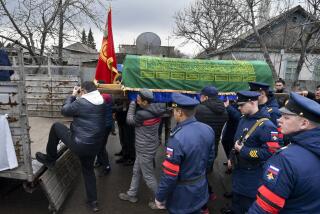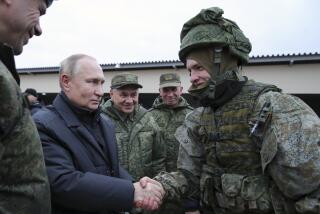Soviets Free to Go, but Hundreds Opt to Stay in Iraq : Workers: Conflict over their departure is resolved. But many apparently are fearful of returning to unsettled homeland.
- Share via
BAGHDAD, Iraq — Less than a week after a delegation from Moscow persuaded the Baghdad government to let Soviet citizens working in Iraq go home, several hundred Soviet technicians are resisting departure, preferring to stay on rather than return to their unsettled homeland, Soviet and Western officials said Saturday.
The Soviets, reported to include military advisers as well as oil and electric-power experts, had been barred from leaving in a dispute over canceled contracts between Moscow and Baghdad.
Visiting Soviet officials cleared up the conflict, Iraqi government officials said, but it now appears that some of the workers believe the rewards for staying in Iraq outweigh the danger of any approaching war over Kuwait.
“The Soviets think the situation here is better for them than in the U.S.S.R. They even believe the food situation is better here,” a Western diplomat said, commenting on the irony that Iraq under a worldwide trade embargo might provide more food for the Soviets here than they would find at home.
Exactly how many Soviets prefer to remain is impossible to determine. The number of Soviet citizens in the country is estimated to total 2,300, the remnant of about 9,000 who labored in Iraq before the Persian Gulf crisis erupted in August.
Nor is it clear whether the Soviets will have any choice in the matter. They came to Iraq under contracts worked out between the two governments, and normally, Moscow would not permit free agency.
“There are certain technicians who do not want to leave,” confirmed an official at the Soviet Embassy here. “But this decision must be made within the framework of state-to-state relations.”
As United States and allied forces prepare to drive Iraq out of Kuwait, the presence of Soviet military personnel as well as civilian experts has become a delicate international issue. The military experts may help Iraq maintain and operate advanced radar systems to counter the threat of air attack from the allied air force.
Iraq appears to harbor hopes that political turmoil in Moscow will reverse Soviet political support for the global anti-Iraq coalition. Iraqi officials here speculated that dissident ministries in President Mikhail S. Gorbachev’s beleaguered government might quietly permit some of the technicians to stay.
Until Iraq invaded Kuwait on Aug. 2, Baghdad counted the Soviet Union among its staunchest allies. Moscow had supplied the regime of President Saddam Hussein with key weapons and economic help.
The Soviet position changed dramatically during the Persian Gulf crisis. In the latest display of disappointment, Iraqi state newspapers printed unflattering farewells to Eduard A. Shevardnadze, who resigned Thursday as the Soviet foreign minister.
The articles singled him out as a cause of the Iraqi-Soviet rupture. “In Iraq, Shevardnadze is looked upon with suspicion,” one article declared.
It accused Shevardnadze of overturning Moscow’s longtime advocacy of an international conference to settle conflicts in the Middle East, the vehicle that Iraq wants to use to disperse the global focus from Kuwait to other regional disputes. It also described Soviet support for U.N. Security Council resolutions that demand Iraq’s unconditional withdrawal from Kuwait as a “sellout.”
Iraqi Foreign Minister Tarik Aziz described Shevardnadze as “not fair” to Iraq, according to a published account of a meeting last Monday between Aziz and the Soviet ambassador to Baghdad.
In contrast to their treatment of Shevardnadze, newspapers praised the Red Army as a bulwark against Soviet liberals, who are blamed here for Moscow’s anti-Iraq stand.
The article on Monday’s meeting appeared to indicate that Iraq places its hopes in Moscow on the defense Establishment. “The army is known for nurturing a strong national pride and for following principled policies,” the report said.
More to Read
Sign up for Essential California
The most important California stories and recommendations in your inbox every morning.
You may occasionally receive promotional content from the Los Angeles Times.













